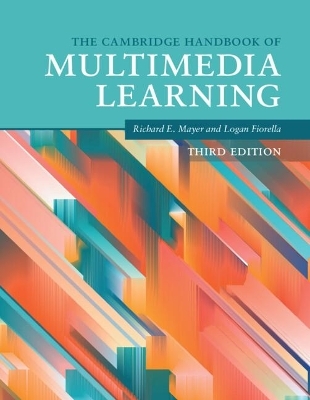
The Cambridge Handbook of Multimedia Learning
Cambridge University Press (Verlag)
978-1-108-81466-9 (ISBN)
Digital and online learning is more prevalent than ever, making multimedia learning a primary objective for many instructors. The Cambridge Handbook of Multimedia Learning examines cutting-edge research to guide creative teaching methods in online classrooms and training. Recognized as the field's major reference work, this research-based handbook helps define and shape this area of study. This third edition provides the latest progress report from the world's leading multimedia researchers, with forty-six chapters on how to help people learn from words and pictures, particularly in computer-based environments. The chapters demonstrate what works best and establishes optimized practices. It systematically examines well-researched principles of effective multimedia instruction and pinpoints exactly why certain practices succeed by isolating the boundary conditions. The volume is founded upon research findings in learning theory, giving it an informed perspective in explaining precisely how effective teaching practices achieve their goals or fail to engage.
Richard E. Mayer is Distinguished Professor of Psychological and Brain Sciences at the University of California, Santa Barbara, USA. He served as President of Division 15 (Educational Psychology) of the American Psychological Association and Vice President of the American Educational Research Association for Division C (Learning and Instruction). Logan Fiorella is Associate Professor of Educational Psychology at the University of Georgia, USA. He is a National Academy of Education/Spencer postdoctoral fellow and a fellow of the Psychonomic Society. He has also served as PI or Co-PI on grants from the National Science Foundation, the Institute of Education Sciences, and the Spencer Foundation.
Part I. Background: 1. Introduction to Multimedia Learning; 2. Foundations of Multimedia Learning; 3. Fifteen common but questionable principles of Multimedia Learning; 4. Research methods in Multimedia Learning; Part II. Theoretical Foundations: 5. Cognitive theory of Multimedia Learning; 6. Implications of cognitive load theory for Multimedia Learning; 7. Integrated model of text and picture comprehension; 8. The four component Instructional Design Model for Multimedia Learning; 9. Motivation and affect in Multimedia Learning; 10. Metacognition in Multimedia Learning; Part III. Basic Principles of Multimedia Learning: 11. The Multimedia Principle; 12. The multiple representation principle in Multimedia Learning; 13. The expertise reversal principle in Multimedia Learning; Part IV. Principles for Reducing Extraneous Processing in Multimedia Learning: 14. Principles for reducing extraneous processing in Multimedia Learning: Coherence, signaling, redundancy, spatial contiguity, and temporal contiguity principles; 15. The split attention principle in Multimedia Learning; 16. The redundancy principle in Multimedia Learning; 17. The Signaling (or cueing) principle in Multimedia Learning; 18. The worked example principle in Multimedia Learning; 19. Principles for managing essential processing in Multimedia Learning: Segmenting, pre-training, and Modality principles; 20. The Modality principle in Multimedia Learning; 21. The Transient information principle in Multimedia Learning; Part VI. Principles Based on Social and Affective Features of Multimedia Learning: 22. Principles Based on Social Cues in Multimedia Learning: Personalization, voice, embodiment, and image Principles; 23. The embodiment principle in Multimedia Learning; 24. The immersion principle in Multimedia Learning; 25. The Collaboration principle in Multimedia Learning; 26. The animation composition principle in Multimedia Learning; 27. The Emotional Design principle in Multimedia Learning; Part VII. Principles Based on Generative Activity in Multimedia Learning: 28. The Generative Activity principle in Multimedia Learning; 29. The Mapping principle in Multimedia Learning; 30. The Drawing principle in Multimedia Learning; 31. The Imagination principle in Multimedia Learning; 32. The Self-Explanation principle in Multimedia Learning; 33. The Guided Inquiry principle in Multimedia Learning; 34. The Feedback principle in Multimedia Learning; 35. The Learner Control principle in Multimedia Learning; 36. The Cognitive Load Self-Management principle in Multimedia Learning; Part VIII. Multimedia Learning with Media: 37. Multimedia Learning with online cognitive tutors; 38. Multimedia Learning with Animated Pedagogical agents; 39. Multimedia Learning with simulations and microworlds; 40. Multimedia Learning with Computer games; 41. Multimedia Learning with Instructional video; 41. Multimedia Learning with Instructional video Logan Fiorella; 42. Multimedia Learning in Virtual and Mixed reality; 43. Multimedia Learning with Visual displays; 44. Multimedia Learning from multiple documents; 45. Multimedia Learning in e-Courses; 46. Principles for educational assessment with Multimedia.
| Erscheinungsdatum | 09.12.2021 |
|---|---|
| Reihe/Serie | Cambridge Handbooks in Psychology |
| Zusatzinfo | Worked examples or Exercises |
| Verlagsort | Cambridge |
| Sprache | englisch |
| Maße | 215 x 279 mm |
| Gewicht | 1540 g |
| Themenwelt | Geisteswissenschaften ► Psychologie ► Allgemeine Psychologie |
| Geisteswissenschaften ► Psychologie ► Pädagogische Psychologie | |
| Geisteswissenschaften ► Psychologie ► Verhaltenstherapie | |
| ISBN-10 | 1-108-81466-2 / 1108814662 |
| ISBN-13 | 978-1-108-81466-9 / 9781108814669 |
| Zustand | Neuware |
| Informationen gemäß Produktsicherheitsverordnung (GPSR) | |
| Haben Sie eine Frage zum Produkt? |
aus dem Bereich


